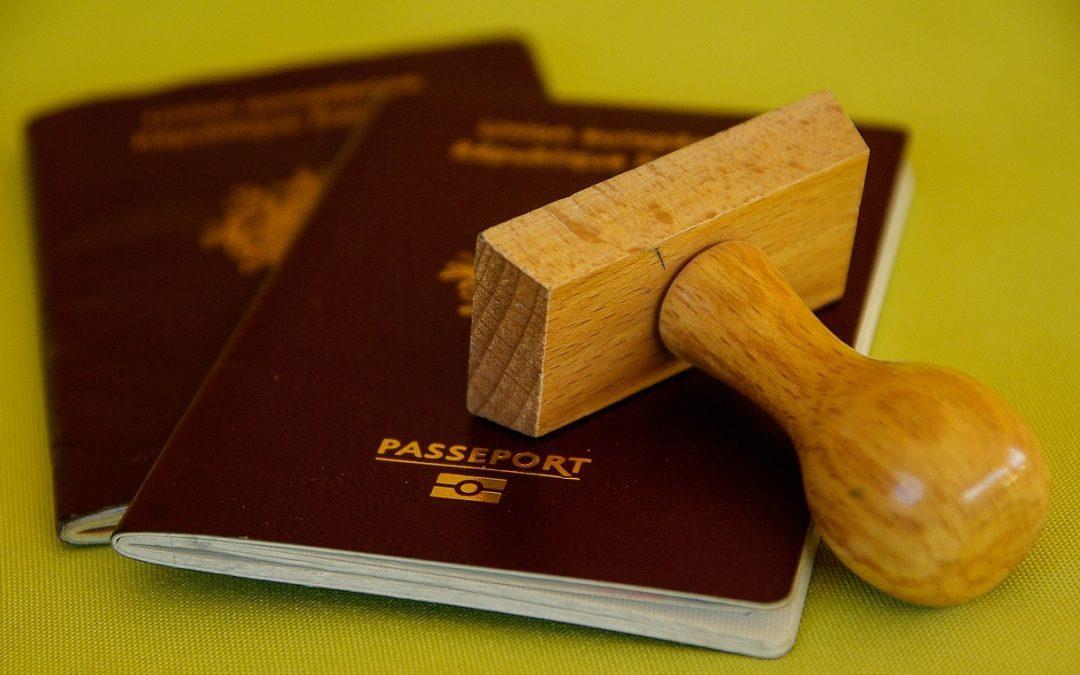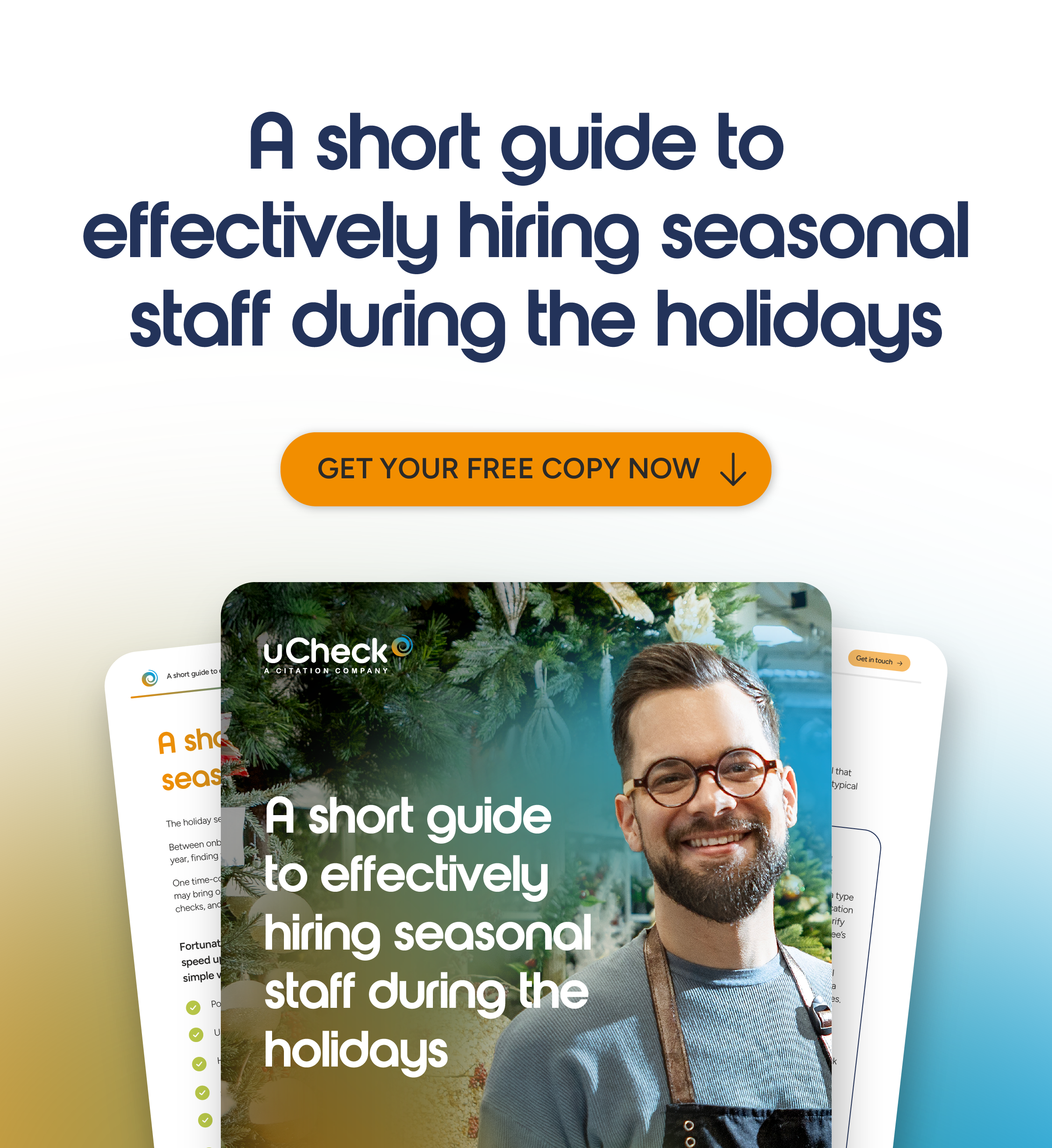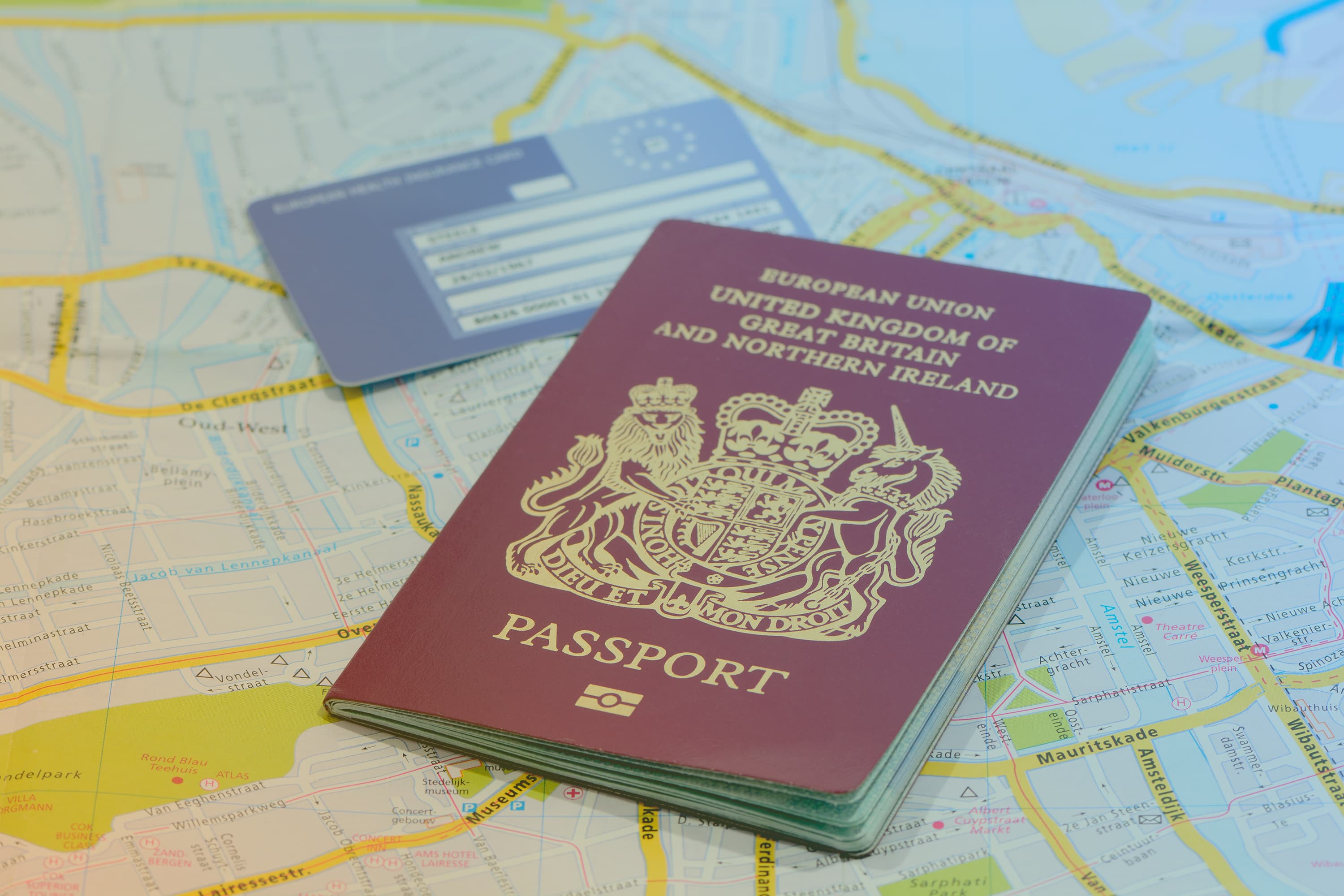Applying for a DBS check? Let’s make it simple.
To confirm the applicant’s identity, you’ll need to provide the right documents – think passports, driving licences, or utility bills. The type of check you need – Basic, Standard, or Enhanced – and the route you take will determine exactly what you need.
If you want to avoid delays and headaches, it’s best to get it right first time. After all, who doesn’t love a smooth process?
Providing the correct documents is essential to avoid delays or rejections, so understanding what you need before you start an application can make the process much smoother. In this guide, we’ll explain everything you need to know about DBS check documentation and the different route options available.
Why are DBS checks important?
DBS checks are all about keeping people safe. This is especially important for anyone working or volunteering in roles that involve children, the elderly, or vulnerable groups.
Criminal background checks give you peace of mind that you’ve got the right people in the right roles. It’s the best way to build trust, safety, and create a secure environment for everyone.
Here are some key reasons why DBS checks are important:
- Safeguarding vulnerable individuals
DBS checks help prevent individuals with a history of serious criminal behaviour, such as abuse or neglect, from working with vulnerable groups.
2. Peace of mind
You and service users can feel more confident knowing that staff members have been thoroughly vetted for any potential risks.
3. Legal and Regulatory Compliance
In some sectors (e.g., healthcare, education, or childcare), DBS checks are a legal requirement for certain roles.
4. Promoting a Safe Work Environment
You can create a safer, more trustworthy workplace by making sure that those you hire have no history of harmful behaviour.
What are the different types of DBS checks you can get?
DBS checks aren’t all the same, there are three main types of DBS checks. They each offer different levels of detail and suitability based on the role and the level of risk:
A Basic DBS check shows a criminal record summary that includes any unspent or conditional causes. Anyone can request a Basic DBS check as there aren’t any eligibility requirements.
They’re common for roles where there’s no direct contact with vulnerable groups, but you want peace of mind about your hiring decisions. Think of roles in retail, admin, and hospitality.
A Standard DBS check gives you a more detailed look at someone’s criminal record, showing both spent and unspent convictions, cautions, reprimands, and final warnings.
You’ll often need this for roles where there’s a certain level of responsibility or trust involved, like jobs in the legal or finance fields. It’s good to keep in mind that while these roles often require it, it’s not always specifically for positions working directly with vulnerable people.
An Enhanced DBS check is the most in depth check you can get, giving employers a really thorough picture. It includes everything in the Standard check, plus any extra details the local police think are relevant.
This detailed check is specifically for roles where people will be working with vulnerable groups, such as children, the elderly, or individuals with disabilities. You’ll commonly see this required for jobs like those in healthcare, childcare, teaching, and social work – roles where safeguarding is key.
What are the different ID groups?
When applying for a DBS check, you must provide certain documents to verify the candidate’s identity. These documents are divided into three main groups: group 1 (primary identity documents), group 2a (trusted government documents), and group 2b (financial and social history documents).
Let’s break down each ID group and what documents are accepted.
Group 1: Primary identity Documents
Group 1 uses your primary identity documents, which include:
- Passport
- Biometric Residence Permit
- Current Photo Driving Licence, Full or Provisional
- Birth Certificate, issued at time of birth (UK and channel Islands)
- Adoption Certificate (UK and Channel Islands)
Group 2a: Trusted government documents
Group 2a covers a wider range of documents that can be used in support of a DBS application, and are usually used in combination with any other document listed in group 1. These documents include:
- Current photo driving licence, full or provisional
- Current driving licence, paper version
- Birth certificate, issued after the time of birth
- Marriage/civil partnership certificate
- HM Forces ID card
- Firearms licence
Group 2b: Financial and social history documents
Group 2b includes some of the more common everyday documents that show information such as proof of address etc. Again these are used in conjunction with documentation from group 1, and include the following:
- Mortgage statement
- Bank/building society statement – including opening confirmation letter
- Credit card statement
- Financial statement e.g. pension, endowment or benefit
- P45/P60 statement
- Council tax statement
- Work permit or visa
- Letter of sponsorship from future employment provider
- Utility bill
- Entitlement document from the government
- EU National ID card
- Cards with the PASS accreditation logo
- Letter from head teacher/principal
The combination you’ll need depends on the route you take. Don’t worry, that’s up next.
Different routes to take with providing documents for DBS checks
When you apply for a DBS, the documents you need depend on the route. The DBS has a simple system to verify identities, and we’re here to guide you through it.
- Route 1
The applicant must be able to provide:
- 1 document from group 1
- 2 additional documents from either group 1, or group 2a or 2b
At least one document MUST confirm the applicant’s current address.
- Route 2
If the applicant can’t provide any of the documents in group 1, then they must be able to show:
- 1 document from group 2a
- 2 further documents from either group 2a or 2b
At least one of the documents must show the applicant’s current address. The employer conducting the applicant’s ID check must request an external ID validation check on behalf of the applicant.
The uCheck team uses a third party organisation to process the ID validation checks for a small fee of £6 inc. VAT. The checks are usually returned within 48 hours.
- Route 3
Route 3 can only be used if it’s impossible to process the application through routes 1 or 2.
For route 3, the applicant must be able to provide:
- A birth certificate issued after the time of birth (UK and Channel Islands)
- 1 document from group 2a
- 3 further documents from group 2a or 2b
At least one of the documents must again show the applicant’s current address.
If the applicant can’t provide these documents, they may need to be fingerprinted.
- Route 4
If route 1, 2 or 3 can’t be completed due to insufficient ID documentation supplied, the only option left for the applicant is to complete a paper application form and have their fingerprints taken at a local police station.
On the paper form, the employer must select NO to W56 (‘have you established the true identity of the applicant’) as this shows they haven’t been able to provide the documents needed and will indicate that the applicant will need to be contacted to attend a fingerprinting session in order to establish the true identity.
How DBS checks differ for UK nationals vs. non-UK nationals
DBS checks are an essential part of safeguarding, but the process differs depending on whether an applicant is a UK national or a non-UK national. While UK nationals follow a straightforward verification process, non-UK nationals may need to provide additional documentation to ensure thorough background checks.
DBS checks for UK nationals
For UK nationals, the DBS check process is relatively simple. Applicants must provide standard identity documents, such as a passport or driving licence, along with proof of address. The DBS then conducts background checks using UK databases, such as:
- The Police National Computer (PNC) – to check for any criminal convictions or cautions.
- The Barred Lists (for Enhanced DBS checks) – to make sure the applicant isn’t prohibited from working with vulnerable groups.
- Local Police Records – for any additional relevant information.
Since the checks are conducted entirely within the UK, applicants don’t need to provide any overseas records.
DBS checks for non-UK nationals
For individuals who have lived outside the UK, additional steps are required to ensure a complete background check.
Additional documentation
Non-UK nationals must provide:
- Standard DBS identity documents, such as a passport and proof of UK address.
- Overseas criminal record checks from any country where they’ve lived for a significant period.
Proof of UK residency
For a Standard DBS check, applicants must typically have lived in the UK for at least five years. If they’ve lived in the UK for a shorter period, additional overseas background checks may be required.
Overseas criminal record checks
Many non-UK applicants must obtain police clearance certificates or criminal background checks from their home countries. These documents vary by country but typically confirm whether the applicant has any criminal history abroad.
- Applicants can find country-specific guidance on obtaining these records from the UK government’s official resources.
- Some employers or regulatory bodies may have additional requirements depending on the role.
Language barriers
If an overseas criminal record check isn’t in English, the applicant may need to provide:
- An official translation of the document.
- A notarised version to verify authenticity.
Why these checks are necessary
Thorough background screening ensures that all applicants, regardless of nationality, meet the same safeguarding standards. Without overseas checks, there would be a risk of missing criminal history outside the UK, which could compromise safety in sensitive job roles.
Additional considerations
- Some roles, especially those involving children or vulnerable adults, may require more in-depth checks.
- If an applicant has spent a significant period abroad, they may need multiple overseas criminal record checks.
- Translations or notarisations may delay the process, so it’s best to prepare these documents in advance.
For more information on obtaining an overseas criminal record check, visit the UK government’s official guidance.
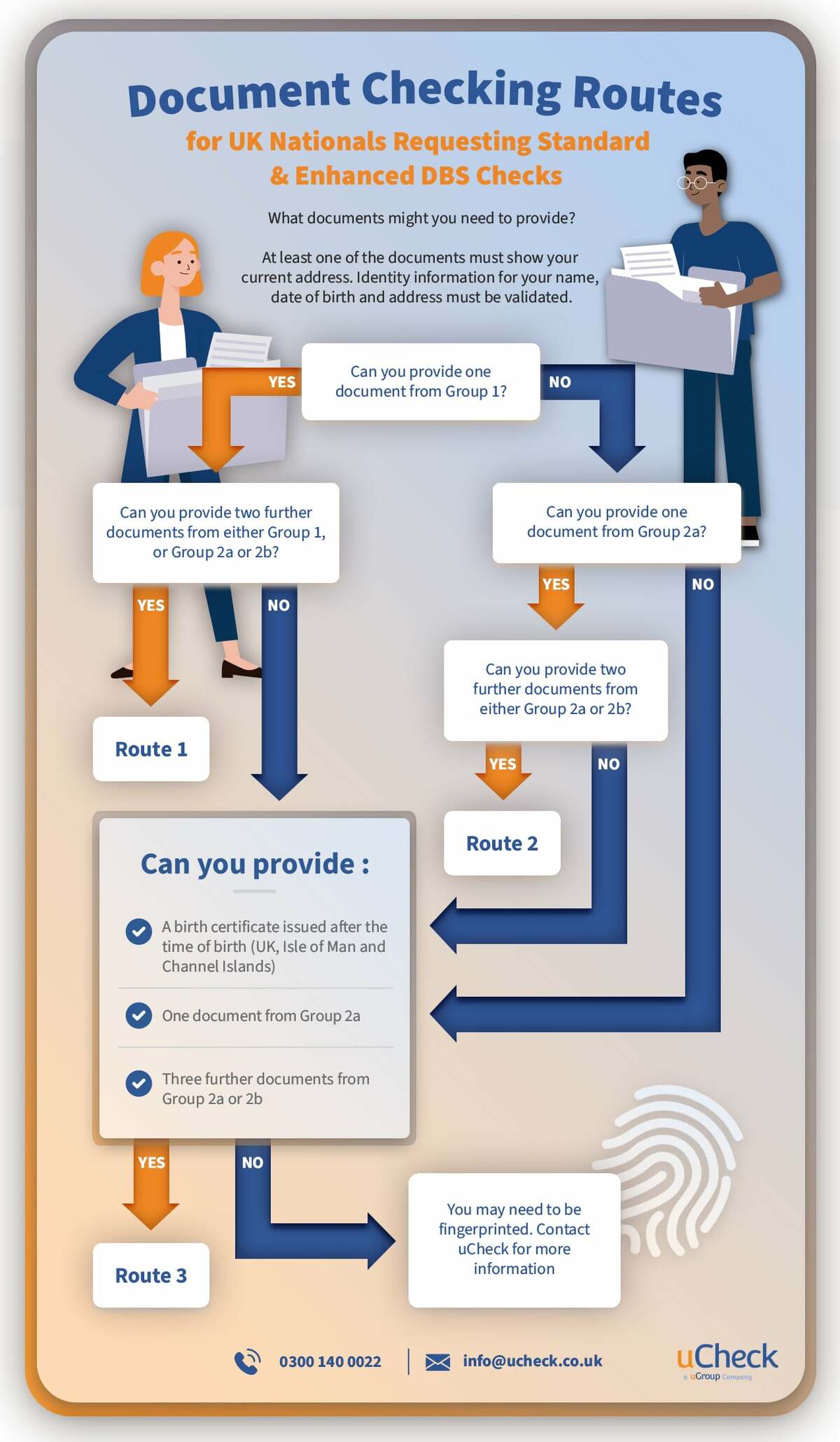
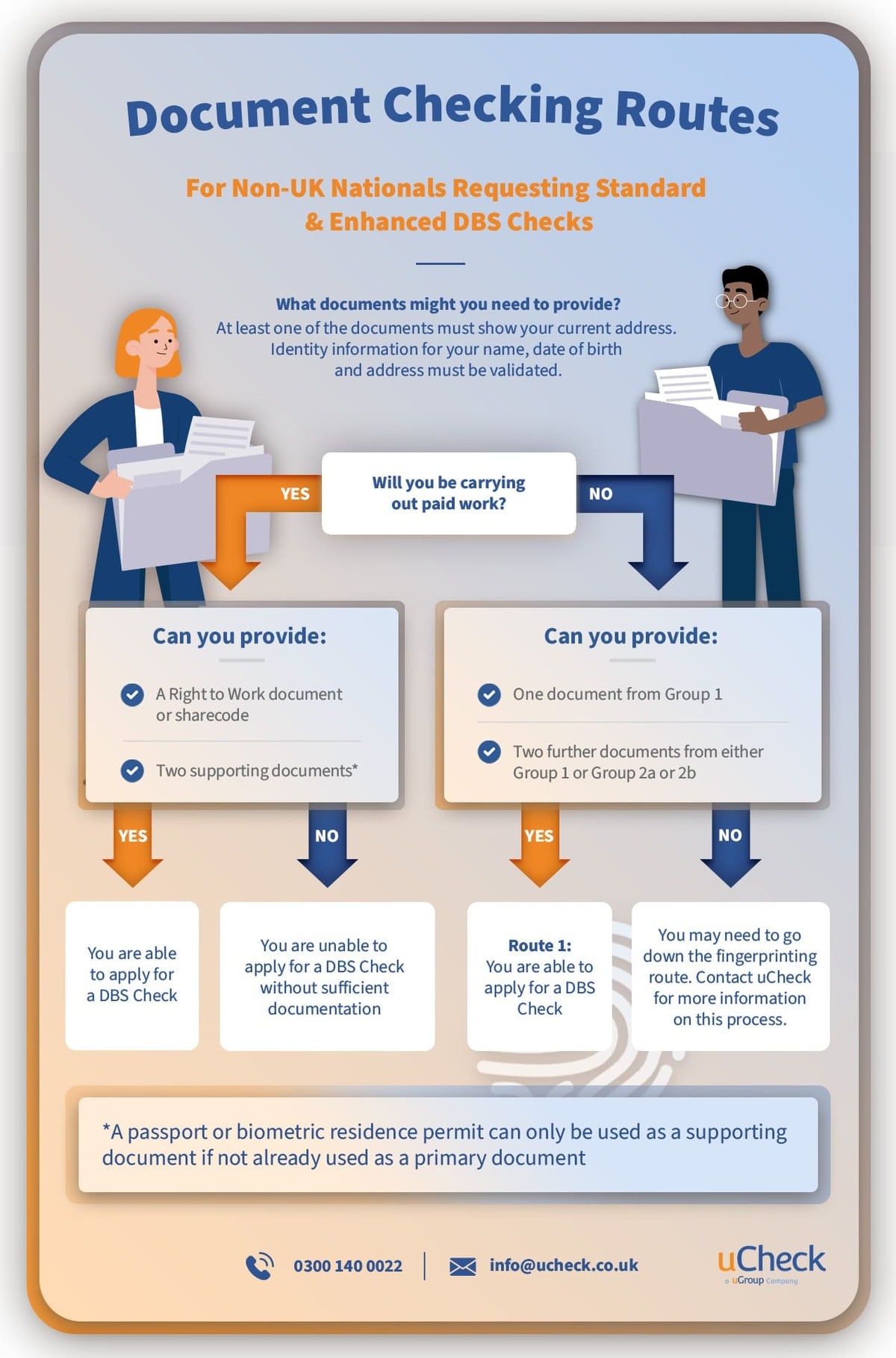
Can I check my own identity?
No, unfortunately, you cannot identity-check yourself or members of the family.
If you, yourself, need a check also, someone else will need to verify your identity documents and send an email to us here at uCheck to info@ucheck.co.uk stating that they have seen your identity documents, that they are all valid, and understand it’ll now be their name being put against the application.
Use uCheck for all your DBS checks
DBS checks play a vital role in safeguarding workplaces and creating trust in professional settings. Whether you’re a UK national or a non-UK national, understanding the different document requirements and verification routes can help streamline the process. UK applicants typically undergo standard UK-based checks, while those who have lived abroad may need additional documentation, such as overseas criminal record checks and proof of residency.
To ensure a smooth and stress-free DBS application, it’s essential to check the official DBS document list and select the correct route for your background check.
At uCheck, we make the process simple. Our fast, efficient, and fully compliant DBS checking services help you get the results you need with minimal hassle. Start your DBS check with uCheck today!

